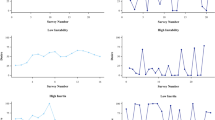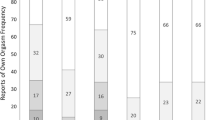Abstract
Sexual dysfunction is the most significant long lasting effect of prostate cancer (PrCa) treatment. Despite the many medical treatments for erectile dysfunction, many couples report that they are dissatisfied with their sexual relationship and eventually cease sexual relations altogether. We sought to understand what distinguishes successful couples from those who are not successful in adjusting to changes in sexual function subsequent to PrCa treatment. Ten couples who maintained satisfying sexual intimacy after PrCa treatment and seven couples that did not were interviewed conjointly and individually. Interviews were transcribed and analyzed using grounded theory methodology. The theory that resulted suggests that individuals are motivated to engage in sex primarily because of physical pleasure and relational intimacy. The couples who valued sex primarily for relational intimacy were more likely to successfully adjust to changes in sexual function than those who primarily valued sex for physical pleasure. The attributes of acceptance, flexibility, and persistence helped sustain couples through the process of adjustment. Based on these findings, a new theory, the Physical Pleasure–Relational Intimacy Model of Sexual Motivation (PRISM) is presented. The results elucidate the main motives for engaging in sexual activity—physical pleasure and/or relational intimacy—as a determining factor in the successful maintenance of satisfying sexual intimacy after PrCa treatment. The PRISM model predicts that couples who place a greater value on sex for relational intimacy will better adjust to the sexual challenges after PrCa treatment than couples who place a lower value on sex for relational intimacy. Implications of the model for counselling are discussed. This model remains to be tested in future research.


Similar content being viewed by others
References
Andersen, B. L., Cyranowski, J. M., & Espindle, D. (1999). Men’s sexual self-schema. Journal of Personality and Social Psychology, 76, 645–661.
Arrington, M. I. (2003). “I don’t want to be an artificial man”: Narrative reconstruction of sexuality among prostate cancer survivors. Sexuality and Culture, 7(2), 30–58.
Basson, R. (2000). The female sexual response: A different model. Journal of Sex and Marital Therapy, 26, 51–65.
Basson, R. (2001). Human sex-response cycles. Journal of Sex and Marital Therapy, 27, 33–43.
Basson, R. (2008). Women’s sexual desire and arousal disorders. Primary Psychiatry, 15, 72–81.
Berterö, C. (2001). Altered sexual patterns after treatment for prostate cancer. Cancer Practice, 9, 245–251.
Canada, A. L., Neese, L. E., Sui, D., & Schover, L. R. (2005). Pilot intervention to enhance sexual rehabilitation for couples after treatment for localized prostate carcinoma. Cancer, 104, 2689–2700.
Canadian Cancer Society’s Steering Committee on Cancer Statistics. (2011). Canadian cancer statistics 2011. Toronto, ON: Canadian Cancer Society.
Chamberlain, K. (1999). Using grounded theory in health psychology. In M. Murray & K. Chamberlain (Eds.), Qualitative health psychology: Theories and methods (pp. 183–201). Thousand Oaks, CA: Sage Publications.
Chambers, S. K., Ferguson, M., Gardiner, R. A., Aitken, J., & Occhipinti, S. (2013). Intervening to improve psychological outcomes for men with prostate cancer. Psycho-Oncology, 22, 1025–1034.
Charmaz, K. C. (2006). Constructing grounded theory: A practical guide through qualitative analysis. London: Sage Publications.
Collins, A. L., Love, A. W., Bloch, S., Street, A. F., Duchesne, G. M., Dunai, J., et al. (2013). Cognitive existential couple therapy for newly diagnosed prostate cancer patients and their partners: A descriptive pilot study. Psycho-Oncology, 22, 465–469.
Davison, B. J., So, A. I., & Goldenberg, S. L. (2007). Quality of life, sexual function and decision regret one year following surgical treatment of localized prostate cancer. British Journal of Urology International, 100, 780–785.
Donovan, K. A., Taliaferro, L. A., Alvarez, E. M., Jacobsen, P. B., Roetzheim, R. G., & Wenham, R. M. (2007). Sexual health in women treated for cervical cancer: Characteristics and correlates. Gynecological Oncology, 104, 428–434.
Giesler, R. B., Given, B., Given, C. W., Rawl, S., Monahan, P., Burns, M., et al. (2005). Improving the quality of life of patients with prostate carcinoma: A randomized trial testing the efficacy of a nurse-driven intervention. American Cancer Society, 104, 752–762.
Manne, S. L., Kissane, D. W., Nelson, C. J., Mulhall, J. P., Winkel, G., & Zaider, T. (2011). Intimacy-enhancing psychological intervention for men diagnosed with prostate cancer and their partners: A pilot study. Journal of Sexual Medicine, 8, 1197–1209.
Masters, W. H., & Johnson, V. E. (1966). Human sexual response. Boston, MA: Little, Brown & Co.
National Cancer Institute. (2011). Surveillance epidemiology and end results stat fact sheets: Prostate. Retrieved from http://seer.cancer.gov/statfacts/html/prost.html#risk.
Pfaus, J. (2008). Models of sexual motivation. In E. Janssen (Ed.), Psychophysiology of sex (pp. 340–362). Bloomington: Indiana University Press.
Plotti, F., Sansone, M., Donato, D. V., Antonelli, E., Altaviall, T., Angioli, R., et al. (2010). Quality of life and sexual function after type c2/type III radical hysterectomy for locally advanced cervical cancer: A prospective study. Journal of Sexual Medicine, 8, 894–904.
Reese, J. B., Keefe, F. J., Somers, T. J., & Abernethy, A. P. (2010). Coping with sexual concerns after cancer: The use of flexible coping. Supportive Care in Cancer, 18, 785–800.
Schover, L. R., Canada, A. L., Yuan, Y., Sui, D., Neese, L., Jenkins, R., et al. (2011). A randomized trial of internet-based versus traditional sexual counselling for couples after localized prostate cancer treatment. Cancer, 118, 500–509.
Schover, L. R., Fouladi, R. T., Warneke, C. L., Neese, L., Klein, E. A., Zippe, C., et al. (2002). The use of treatments for erectile dysfunction among survivors of prostate carcinoma. Cancer, 95, 2397–2407.
Strauss, A., & Corbin, J. (1998). Basics of qualitative research: Techniques and procedures for developing grounded theory. Thousand Oaks, CA: Sage Publications.
Warkentin, K. M., Gray, R. E., & Wassersug, R. J. (2006). Restoration of satisfying sex for a castrated cancer patient with complete impotence: A case study. Journal of Sex and Marital Therapy, 32, 389–399.
Wittmann, D., Northouse, L., Foley, S., Gilbert, S., Wood, D. P., Balon, R., et al. (2009). The psychosocial aspects of sexual recovery after prostate cancer treatment. International Journal of Impotence Research, 21, 99–106.
Author information
Authors and Affiliations
Corresponding author
Rights and permissions
About this article
Cite this article
Beck, A.M., Robinson, J.W. & Carlson, L.E. Sexual Values as the Key to Maintaining Satisfying Sex After Prostate Cancer Treatment: The Physical Pleasure–Relational Intimacy Model of Sexual Motivation. Arch Sex Behav 42, 1637–1647 (2013). https://doi.org/10.1007/s10508-013-0168-z
Received:
Revised:
Accepted:
Published:
Issue Date:
DOI: https://doi.org/10.1007/s10508-013-0168-z




